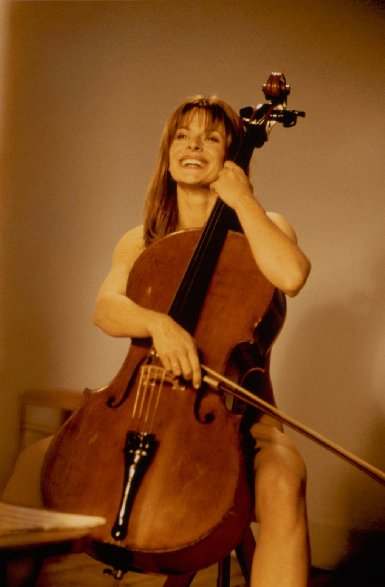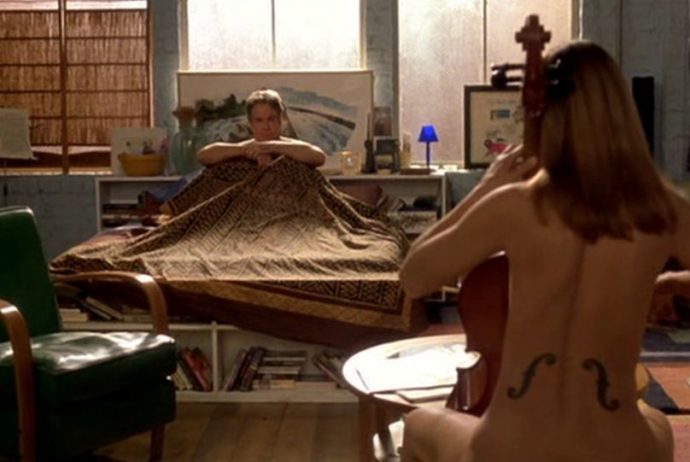Dir: Peter Chelsom
Star: Warren Beatty, Garry Shandling Jr., Diane Keaton, Nastassja Kinski
Or, “Lifestyles of the rich and noxious,” as I increasingly felt like it should have been titled. Because there’s not a character here with whom I felt the slightest connection. My political views don’t exactly tend toward the anarchist generally; yet, by the end of this, I was fully prepared to man the barricades and eat the rich. #ClassWarNow. It starts in a striking fashion, with architect Peter Stoddard (Beatty) lying in bed, watching a naked Alex (Kinski), as she plays the cello – complete with fetching sound-hole tattoos on the small of her back. Hang on, wasn’t she also a sexy cello player in Exposed? Anyway, you certainly have my attention. Now what?
Turns out this was his first infidelity, after decades of relatively happy marriage to interior designer Ellie (Keaton). But he’s not the only one having a midlife crisis, as the marriage of his best friend, Griffin (Shandling), is also on the rocks after his wife Mona (Goldie Hawn) spots him having an extra-marital tryst at a motel. What neither Mona nor Peter know, is Griffin is actually gay. In short order, this leads to Peter having a fling with Mona, then a trip to Sun Valley for him and Griffin, in an effort to get away from it all. But this only leads to further affairs, with heiress Eugenie Claybourne (Andie McDowell), and also a hardware store clark, Auburn (Jenna Elfman). These issues then end up following Peter back to his home in New York, and colliding at an awards gala.
 If you’re thinking this sounds tedious, you are right on the mark and I am doing my job with the apathetic synopsis above. For this is one of those cases where the production was rather more interesting that the film itself. Even before it came out, the film was described as being accompanied by “a pervasive sense of doom like none that has attached itself to a major Hollywood release in a long time.” The results were perhaps even worse, as you’d expect given a release postponed more than a dozen times, with the film eventually seeping out almost three years after production began.
If you’re thinking this sounds tedious, you are right on the mark and I am doing my job with the apathetic synopsis above. For this is one of those cases where the production was rather more interesting that the film itself. Even before it came out, the film was described as being accompanied by “a pervasive sense of doom like none that has attached itself to a major Hollywood release in a long time.” The results were perhaps even worse, as you’d expect given a release postponed more than a dozen times, with the film eventually seeping out almost three years after production began.
There’s general agreement on the main cause: the film went into production without a finished script. However, this was merely the tip of a nightmarish iceberg of problems. Gerard Depardieu was originally supposed to play Griffin, until he hurt his back and had to be replaced. Reports have the director and star clashing over artistic direction – it was Beatty’s first purely acting gig in a quarter century and he seemed reluctant to stick to that job. Film canisters were stolen and ransomed. Jenna Elfman’s hair fell out. Shooting was unable to finish in the allotted time, and the actors left to work on other projects. Disastrous test screenings led to rewrites and reshoots.
Just not enough rewrites and reshoot, it appears. The film stumbles, right out of the gate. When the first thing you see is a man cheating on his wife, any moral audience member generally loses sympathy for him, and the movie offers little or no reason thereafter to change that opinion. It appears the original script had both he and Ellie being unfaithful, which would at least have made the film’s conclusion somewhat credible. But it appears that symmetry was lost in the rewrites, as did any reason why women, literally half Beatty’s age [at the point of release, he was 64 and Elfman 29] throw themselves at him.
Random plot points stick out all over the place. Alex is pregnant! Oh, never mind: Peter’s not the father. Please carry on. Charlton Heston shows up, playing a gun nut, with a foul-mouthed, wheelchair-bound wife. Oh, hold my aching sides, for I fear they may split. The film seems to think that throwing recognizable faces on screen is the equivalent of the wit and sophistication shown by Golden Era screwball comedies, hoping to skate by on the success of previous pairings e.g. Beatty and Hawn in Shampoo. Or perhaps its aiming for some kind of Woody Allen, Big Apple vibe – the presence of Keaton certainly suggests this.
The end result, however, is a comedy without significant laughs, and a drama without any drama at all. Kinski does at least come out of it relatively unscathed. We’ve discussed her unsuitability for humor previously, and wisely, she’s left out of the film’s increasingly desperate and flailing attempts in this department, though only her cello-playing sticks in the mind [. I’ve never seen Shandling in anything of note, and there’s nothing here that would make me want to change that situation. But it’s Beatty who embarrasses himself worst here, an aging Lothario playing a reluctant aging Lothario for the non-existent amusement of the viewer. While there’s no denying Beatty’s talents elsewhere, he’s horribly unsuited to this ill-conceived and poorly executed exercise.
Kinski has had her share of commercial failures over her career: One From the Heart and Revolution being the most notable. But this is perhaps the biggest flop of them all. Town & Country cost an estimated $90 million, not including distribution or marketing. Its worldwide box-office take: slightly below $10.4 million. It still crops up in articles about the biggest box-office bombs of all time, while Warren Beatty has literally not been part of another feature in the 15 years since. Hardly a ringing endorsement of the film, that its star immediately gave up making movies. Especially when this was the same man who had doggedly chosen to persevere in Hollywood after Ishtar – which, incidentally, cost about $40 million less than Town & Country, while taking more at the box-office. In this case, the popular audience appears to have got it right.
